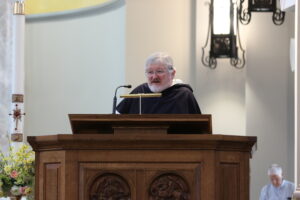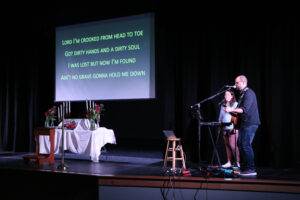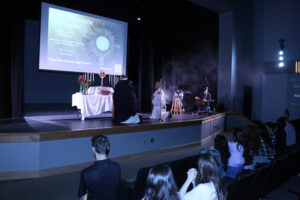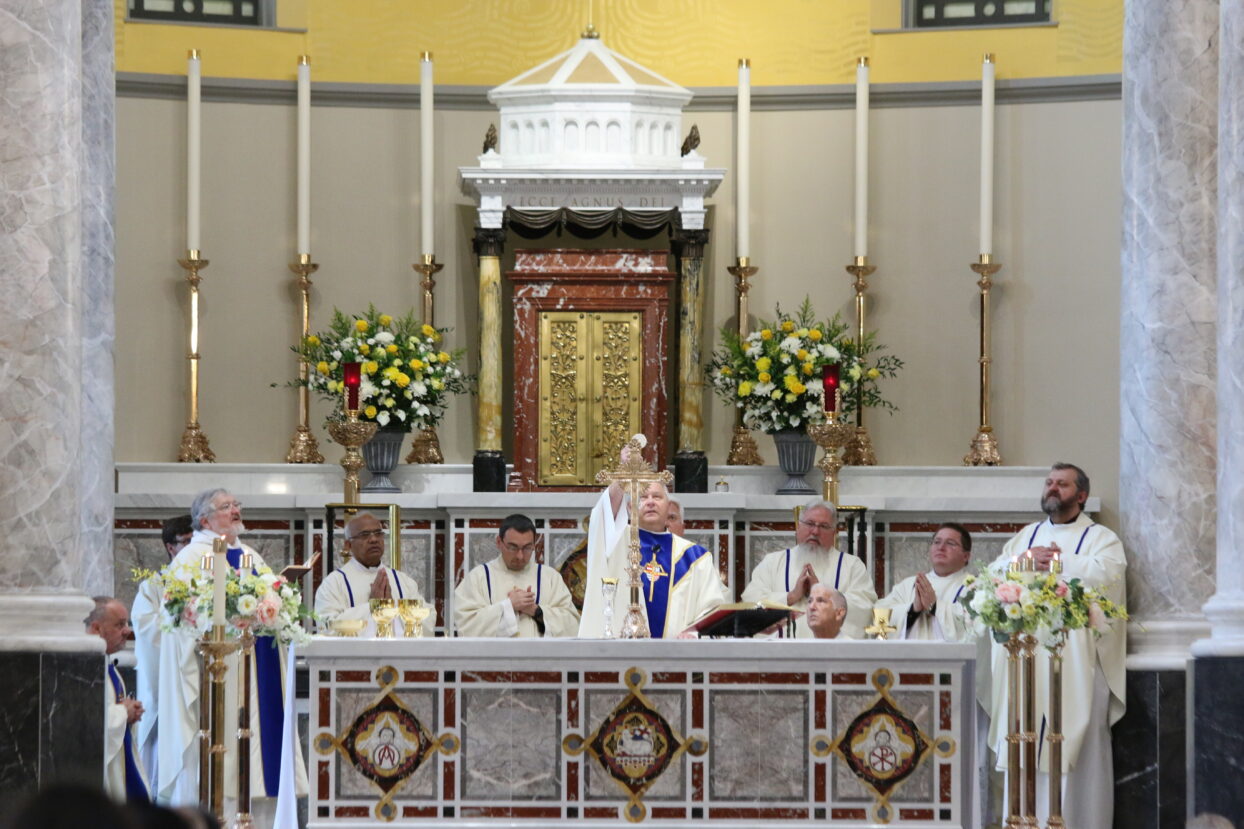Eucharistic Revival events focus on Church teachings, increasing love of Christ
By Emily Booker
“This saying is hard; who can accept it?” (John 6:60) This was the response of many of Jesus’ disciples when He said He was the Bread of Life and that “whoever eats my flesh and drinks my blood has eternal life” (John 6:54).
John 6 is often called the Bread of Life Discourse because it is there in Scripture that Jesus talks about the importance of receiving Him as the Bread of Life to gain eternal life. Even as some followers are confused and turn away, He is resolute in this message. It is here, the Church teaches, that Jesus explains the power of the sacrament of the Eucharist.
Appropriately, John 6 was the Gospel reading April 28-29, when Father Stephen Dominic Hayes, OP, visited Knoxville to lead three events aimed at increasing the faithful’s understanding of Christ’s true presence in the Eucharist.

Father Stephen Dominic Hayes, OP, speaks on the Eucharist at the Cathedral of the Most Sacred Heart of Jesus as part of a series of Eucharistic Revival talks April 28-29 for the Diocese of Knoxville.
Father Hayes, who is from the Diocese of Columbus, Ohio, and is a Dominican priest with the Province of St. Joseph, has been appointed one of 56 Preachers of the National Eucharistic Revival by the U.S. Conference of Catholic Bishops. In that role, he is traveling the country during the duration of the National Eucharistic Revival sharing his knowledge and love of the Eucharist.
Deacon Jim Bello, director of the Office of Christian Formation for the Diocese of Knoxville, explained why he invited Father Hayes to the diocese.
“As coordinator of the Eucharistic Revival, one of the first priorities for our team was to find ways to shed light on the realities of the great mysteries that await God’s children in the Eucharist. We immediately began to seek speakers and preachers who were known for their study of and devotion to this source and summit of our Catholic faith,” Deacon Bello said.
The National Eucharistic Revival arose after reports showed many Catholics—even faithful ones—lacked an understanding of the Church’s teachings on the Blessed Sacrament.
“I’ve been asked to preach the Eucharist for the next three years because of the condition, apparently, of the knowledge, or lack of knowledge, of this among the faithful,” Father Hayes said.
“You know, the bishops did a survey a couple years ago where according to their numbers, 71 percent of the people in the pews did not and could not understand or communicate the truth of the doctrine of the Blessed Eucharist: that Jesus Christ is present body and blood, soul and divinity, in that most Blessed Sacrament, that this is what we come to honor, to adore, to worship, and through Him also the Father and the Holy Spirit on a Sunday.”
On April 28, Father Hayes led an afternoon of reflection for diocesan priests, deacons, religious, and Chancery staff. The afternoon began with Mass at the Cathedral of the Most Sacred Heart of Jesus celebrated by Bishop Richard F. Stika and with Father Hayes concelebrating.
In his homily, Father Hayes shared how he was surprised when he learned that members of his own family didn’t know that Christ is truly present in the Eucharist. He had celebrated Mass for his family on Corpus Christi and preached about the sacrament. Afterward, his brother approached him.
“My brother, Gregory, who’s about 40, comes up and says, ‘I learned something today.’ ‘What did you learn?’ I said. ‘I learned that Jesus Christ is present body, blood, soul, and divinity in the Blessed Eucharist.’ I said, ‘Gregory, you went to Catholic grammar school, you went to Catholic high school. I think [Boston College] is still a Catholic college. You went, you go to church every Sunday, you’re devout, you’re good to God’s people. How did you miss this?’ He just sort of spread his hands and said, ‘I thought it was a symbol.’”
Father Hayes noted how this idea is common, especially in this materialistic age that only believes in what can be physically seen and touched. But the power of God works both through and beyond His creation. Through the bread and wine becoming the holy Eucharist, Christ is fully present with the faithful.
“As we stand at the altar, let us ask the Lord to open our hearts that we may see Him,” Father Hayes said. “See him, the glorified One, the timeless breaking into our time to touch us, heal us, be medicine and food for us, this new manna. The old bread [manna] that came down from heaven, people ate and died, for it served only the needs of the body. This serves our whole being and opens to us an inheritance of glory. This is a meal that consumes those who receive it.”
After Mass, Father Hayes gave a talk on the parallels between the Jewish celebration of Passover and the institution of the Eucharist at the Last Supper. He stressed the importance of recognizing the mystical power of Christ at every Mass.
“This is the work of the Eucharist. ‘Do this in memory of me.’ A commandment. Difficult as it may be for us to understand. Where angels come down and sing songs, a new temple and altar, built and gathered by souls—this is what we have in the Mass. We need the Mass. We need it so we don’t fall into the darkness again, so we don’t fall into pride and choose our own sins.
“Meditate on what it is that we have in the sacrament of the altar: Jesus Christ glorified, reaching out and shaping the body of His Bride to His Father’s wishes with the Holy Spirit.”

Performers Matt and Becky Collins sing contemporary Catholic songs as part of the Diocesan Youth Holy Hour on April 28 at Knoxville Catholic High School. Father Hayes spoke to diocesan youth about the Eucharist and how vital it is to the Catholic faith.
The evening of April 28, Father Hayes led the Diocesan Youth Holy Hour at Knoxville Catholic High School. Sister Madeline Rose Kraemer, OP, who teaches at the high school, organized the event for middle school and high school youth to draw closer to Christ in the Eucharist. The evening offered eucharistic adoration, live worship music, a talk by Father Hayes, small-group discussions, and confession.
Father Hayes, quoting St. Thomas Aquinas, told the young people, “When Christ becomes our food, the memory of His Passion is celebrated. The soul is filled with grace, and the pledge of future glory is given to us.”
The priest urged his audience of students to carefully consider what was before them as he pointed to the shining monstrance holding the holy Eucharist.
“For people who have no faith, they will see just a bit of bread and a golden throne. They will not see that what that throne contains—what the gold contains—is far more precious than the gold, or any amount of gold or silver could be. Because that is how Jesus makes His presence among us,” Father Hayes said.
He reminded them that Jesus walked among His people, “tasting the bitterness of what it is like to be human,” and allowed Himself to be taken by sin and death at work in the world.
“Whether you love Him or hate Him, He died for you. Whether you’re not sure what you feel for Him, He died for you,” Father Hayes said, emphasizing Jesus’ undying love for His people and the love and mercy His blessed mother, Mary, also has for His people.
Father Hayes assured his young congregation that Jesus’ life, death, and resurrection, while they occurred many years ago, continue to play out in real time as Jesus’ teachings still are being fulfilled. Jesus is with His people every day as He “breaks into our lives, to be a companion, a friend, a God, a Savior, a healer for you and each one of us.”
Deacon Bello was inspired by the youth who gave their time to be in the presence of the Lord and by Father Hayes’ message to the students.

Father Hayes, assisted by Deacon Jim Bello, leads adoration in the St. Gregory the Great Auditorium at Knoxville Catholic High School.
“It was moving to witness this group of young people, on a Friday night, not doing what kids normally do after a hard week of school, but rather gathering in this auditorium in obvious joyful anticipation of spending time with our Lord,” Deacon Bello said. “It was almost as if the Holy Spirit was tangible in the auditorium as these young men and women lifted their hearts in praise and adoration, and as they allowed the message of ‘you are deeply loved and called to love’ to penetrate their hearts.”
On Saturday, April 29, Father Hayes led a morning of eucharistic reflection at the Cathedral of the Most Sacred Heart of Jesus for the diocese following Mass celebrated by Bishop Stika. Father Hayes concelebrated the Mass.
Father Hayes told the Saturday morning congregation that his newly appointed ministry is to hopefully help reverse the trend of Catholics who don’t believe that the Eucharist is the true presence of Jesus made possible by the consecration of the priest during the holy sacrifice of the Mass.
Recent surveys show that a large percentage of Catholics believe the Eucharist is only symbolic of Jesus Christ, which is antithetical to Scripture, Church teaching, and catechesis.
“After the moment of consecration, it’s Jesus. It is Jesus,” Father Hayes said. “We live in a society that has been damaged by the so-called ‘enlightenment.’ For the past 200 or more years, the powers that be in politics, universities, in culture, have been trying to organize society without the Gospel. That is the purpose of the ‘enlightenment.’”
He said the world increasingly is turning away from the totally unselfish love of Jesus Christ as a model of human behavior.
But Father Hayes pointed out that Jesus’ undying love is poured out through His heart, which was pierced as he was crucified on the cross. His love continues to flow through that sacred heart, enough love to heal the world for those who believe, and believe that He is present in the Eucharist.
Following his eucharistic reflection, Father Hayes said he was grateful to bring the message of Jesus Christ to members of His Church.
“I think people are very, very hungry for the Eucharist. I think we have a problem of under-catechesis. It’s not that people don’t know what they should, it’s just that I don’t think it has sunk in, partly because of the radical materialism of our world,” Father Hayes said.
“I do think that this so-called ‘enlightenment,’ which I spoke of, has for the past 200 years been trying to organize society without the Gospel on national levels. Then you get the secularisms and the atheisms, which are so deadly once they get organized in the present age,” he added.
“But at the heart of it is a failure to address the God who loves us, the God who comes to us in the Eucharist with humanity. This is such an amazing idea that many people don’t get it,” he continued.
Father Hayes pointed out that light must precede love. “You can’t love what you don’t know, what you don’t see.”
“We need the meditation and the attention that faith and doctrine bring to open our minds to the presence of Him, who loves us so much, whose heart remains open to shower us with grace and to shape our humanity in the direction of His own, morally and even physically when we get to the glory of the world to come,” he continued.
Father Hayes believes the Catholic Church and her people need to be working to reverse the trends that are eroding faith.
“I suggest that we roll up our sleeves and get to work. A warrior can only influence a battle as far as his sword will reach. All of us are summoned to be part of the army of the Lord. Come to know Him yourself first, and then speak of what your eyes of faith have seen, as St. John says, what our hands have touched. The Eucharist is God come to us in a tangible and visible way precisely as food to nourish us, to be the Bread of Life,” he said.
Deacon Bello was grateful for and inspired by Father Hayes’ message at a time when the people of God—and perhaps some who are not churched—most need to hear it.
“Father Hayes was able to take a message of communion among the members of Christ’s Body and the love Christ shares with us in His Eucharistic Body and impart that message with the right amount of theology and heart necessary for each group,” Deacon Bello said.
To learn more about the Eucharistic Revival in the Diocese of Knoxville, visit dioknox.org/revival.

